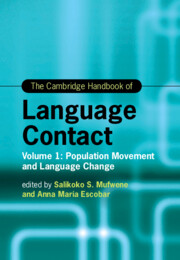Book contents
- The Cambridge Handbook of Language Contact
- Cambridge Handbooks in Language and Linguistics
- The Cambridge Handbook of Language Contact
- Copyright page
- Contents
- Maps Volume I
- Figures Volume I
- Tables Volume I
- Contributors
- Preface
- Introduction
- 1 Language Contact: What a Rich and Intellectually Stimulating History since the Late Nineteenth Century!
- Part One Language Contact and Genetic Linguistics
- Part Two Linguistic Areas
- Part Three Language Spread
- Part Four Emergence and Spread of Some European Languages
- Part Five Language Diasporas
- Author Index
- Language Index
- Subject Index
- References
1 - Language Contact: What a Rich and Intellectually Stimulating History since the Late Nineteenth Century!
from Introduction
Published online by Cambridge University Press: 02 June 2022
- The Cambridge Handbook of Language Contact
- Cambridge Handbooks in Language and Linguistics
- The Cambridge Handbook of Language Contact
- Copyright page
- Contents
- Maps Volume I
- Figures Volume I
- Tables Volume I
- Contributors
- Preface
- Introduction
- 1 Language Contact: What a Rich and Intellectually Stimulating History since the Late Nineteenth Century!
- Part One Language Contact and Genetic Linguistics
- Part Two Linguistic Areas
- Part Three Language Spread
- Part Four Emergence and Spread of Some European Languages
- Part Five Language Diasporas
- Author Index
- Language Index
- Subject Index
- References
Summary
This chapter is about the evolution of language contact as a research area from the late nineteenth century to the present. It underscores the catalyst part that the discovery of creoles and pidgins by European philologists and other precursors of modern linguistics played in highlighting the roles of population movement and language contact as actuators of language change and speciation. It draws attention to the significance of the study of language evolution in European colonies in making evident the realities of language coexistence. These include the possible competition that can cause language shift and the death of one or some of the coexistent languages, a process that has affected competing European vernaculars faster than it has, for instance, Native American languages. It underscores the expansion of the field as linguists became interested in phenomena such as interference, codeswitching (or translanguaging), codemixing, diglossia, language diasporas, and linguistic areas, as well as factors that facilitate or favor the evolution of structures, sometimes of the same language, in divergent ways, owing to changes in population structures.
Keywords
- Type
- Chapter
- Information
- The Cambridge Handbook of Language ContactVolume 1: Population Movement and Language Change, pp. 3 - 40Publisher: Cambridge University PressPrint publication year: 2022

